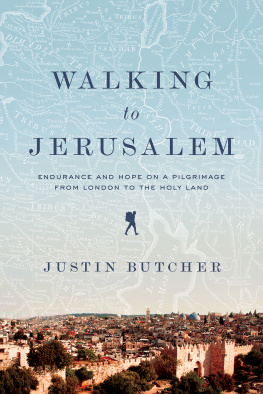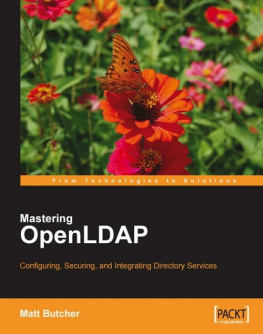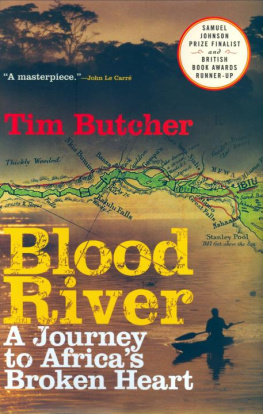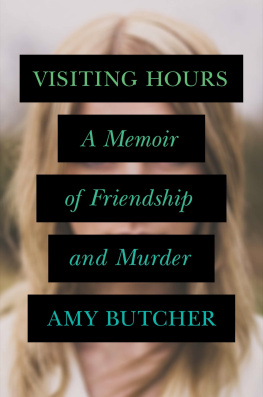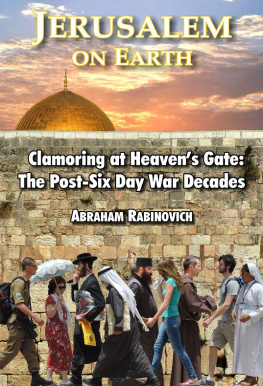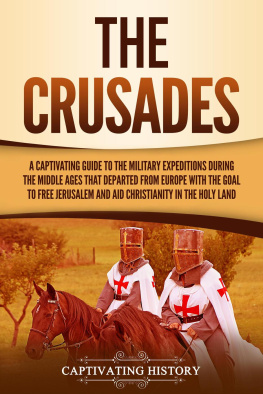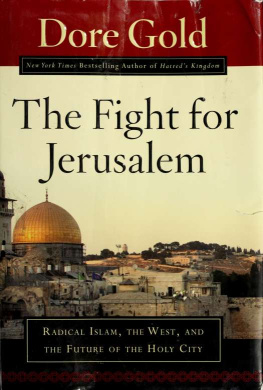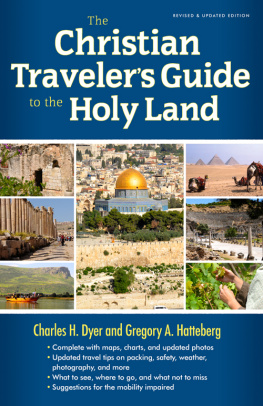Contents

WALKING to
JERUSALEM
ENDURANCE AND HOPE ON A PILGRIMAGE
FROM LONDON TO THE HOLY LAND
JUSTIN BUTCHER

PEGASUS BOOKS
NEW YORK LONDON
W ALKING TO J ERUSALEM
Pegasus Books, Ltd.
148 West 37th Street, 13th Floor
New York, NY 10018
Copyright 2019 by Justin Butcher
First Pegasus Books hardcover edition September 2019
All rights reserved. No part of this book may be reproduced in whole
or in part without written permission from the publisher, except by reviewers
who may quote brief excerpts in connection with a review in a newspaper, magazine,
or electronic publication; nor may any part of this book be reproduced, stored in a
retrieval system, or transmitted in any form or by any means electronic, mechanical,
photocopying, recording, or other, without written permission from the publisher.
Library of Congress Cataloging-in-Publication Data is available
ISBN: 978-1-64313-211-2
ISBN: 978-1-64313-274-7 (ebook)
For Nancy
who has walked with me
up hill and down dale
through wind and rain
through thick and thin
Contents
Hope imagines the future and then acts as if that future is irresistible.
(Walter Wink)
There is no hope without risk.
(Zoughbi Al-Zoughbi)
The real changes happen by what I would call the conversion of the feet.
(Fr Michael Czerny SJ,
Migrants and Refugees Section, vatican City)
Hope is by its nature something projected into the dark.
(Rowan Williams)

F OR THIRTY YEARS Amos Trust has chosen to walk a path of faithful and active solidarity with the Palestinian people. Its built strong partnerships with the dwindling Christian community in the West Bank and Gaza Strip; its taken pilgrims to see the reality of the Occupation up close; its rebuilt Palestinian homes demolished by Israels discriminatory planning regulations; and its encouraged and funded creative and non-violent resistance to an oppression the world is fully aware of but refuses to take meaningful action against. The mantra Amos has adopted to express what the future of Israel/ Palestine should look like cuts through all the possible constitutional arrangements to focus on one non-negotiable point: Equal rights for all who call the Holy Land home. It always surprises me just how controversial this statement turns out to be.
The centenary of the Balfour Declaration presented a particular challenge for Amos. It was an anniversary likely to be little remembered by the general public in the UK but hugely significant to Palestinians who date their suffering from this act of British imperial hubris. As an organisation that took seriously its commitment to find creative ways to express justice for the forgotten, it needed an act that was bold and distinctive and would be welcomed by Palestinians even if it was ignored back home. A conference or a demonstration or a petition would hardly fit the bill. Something else was required. Justin Butcher, a longtime friend of Amos, had the answer. That thirty-year walk of active solidarity should have a literal expression in this anniversary year. An actual walk. A real pilgrimage. A collective penance. A Just Walk to Jerusalem to deliver a simple, clear message that said were sorry this has happened to you, it was wrong.
The idea was beautiful and crazy. The logistics alone would be an organisational nightmare. The risk assessment would run for pages. It would be a five-month, 3,300-kilometre trek across eleven countries with mountains, rivers and seas to navigate. And then there was no guarantee that the walkers would even be allowed to cross the border into the occupied West Bank, let alone reach Jerusalem. Every step would be a leap of faith. It was typical of Amos Trusts culture of moral audacity to say lets do it!.
Justins account of Walking to Jerusalem is a wonderful, unique mix of travelogue, activists diary, history lesson, spiritual reflection and, occasionally, first aid for healing wounded feet. It works on all these fronts, reflecting the daily experience of the walkers themselves especially the nine aged from 18 to 67 who undertook the entire journey.
Perhaps an unanticipated consequence of walking to Jerusalem was the encounter it created with a thousand years of European history in all its power, glory and acts of injustice. The medieval cathedrals with their stories of heroic crusades to the Holy Land; the rusting weaponry of the Great War still being ploughed up by French farmers each year; the Jewish experience of Europe, good, bad and deadly; and now, Syrian refugees, the latest arrivals struggling for acceptance.
Its never easy to know if anything we do in the name of equality and human rights will make a difference. Will the powers that be see the light? Will lives be made better? Will our message be remembered by tomorrow morning? Its the perennial dilemma faced by activists for the common good all over the world. The odds are stacked against us. If they werent, we wouldnt need activists in the first place.
In the context of Israel/Palestine, the standard dilemmas are multiplied. There are good reasons for this. The Palestinian people have had, to quote their most articulate advocate Edward Said, the extraordinarily bad luck to have as their adversary the Jewish people, the most morally complex of all opponents with a long history of victimization and terror behind them. In other words, the Palestinians have paid a very high price for the rest of the worlds anti-Semitism. The activists call for Palestinian rights becomes interpreted (sometimes spun) as an attack on Jewish safety in a world thats proved itself catastrophically unreliable in assuring that safety.
This undoubtedly complicates matters. But it doesnt change the facts on the ground for the Palestinian people. Their dispossession and ongoing oppression is also real. The challenge is to remain mindful of past iniquities without it blinding us to present injustices.
While the walkers were making their way across the continent, I was back home criss-crossing the UK wrestling with what Edward Said meant by the most morally complex of all opponents. In numerous church halls and Quaker meeting houses I gave my talk on Jewish opposition to Balfour, in 1917 and since then. Sadly I never spoke at a synagogue, although thats where I most wanted to tell my story. I tried to make the point that the Balfour Declaration had profound, but vastly contrasting, consequences for Jews and Palestinians. As we got closer to the anniversary, I watched as Jewish religious and community leaders, and Israels Ambassador to the UK, Mark Regev, attempted to turn Balfour from a piece of realpolitik into holy scripture. They were turning criticism of Balfour into a curious mix of blasphemy and anti-Semitism. I knew there was nothing blasphemous or anti-Semitic about the Just Walk to Jerusalem. The sanctification of Balfour could only create another roadblock on the path to justice and peace.
We have to thank the Prime Minister, Theresa May, for turbo-charging the final days of the pilgrimage. Helpfully, she repeated her wish to celebrate the Balfour anniversary with pride during a Prime Ministers Question time in the House of Commons a week before the Balfour anniversary. It was a comment that revealed much about the Prime Ministers willingness to dismiss the lived experience of millions of Palestinians. Mrs Mays acknowledgement that there was still work to be done to achieve peace was either a wonderful example of British understatement or, more likely, a failure to recognise the fundamental injustice crammed into those sixty-seven words of diplomatic duplicity. The Prime Ministers remarks werent headline news in the UK but the Palestinian media were all over it. And here were a bunch of Brits, some of whom had walked a couple of thousand miles, determined to make the apology that their government refused to countenance. The Just Walk to Jerusalem was succeeding in one of its key aims to disrupt the official UK narrative and show the Palestinian people that they were not forgotten.

